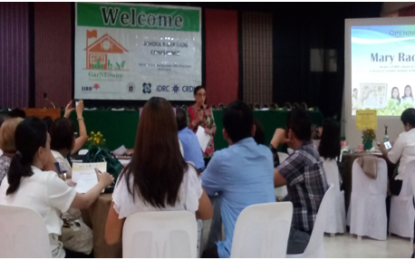
FOOD SECURITY.Mary Racelis, International Institute for Rural Reconstruction (IIRR) Board Trustee and also research scientist of the Institute of Philippine Culture, welcomes education planners to the forum on “Improving Food and Nutrition Security in the Philippines through School Intervention” at the IIRR Y.C. James Yen Center in Silang, Cavite on May 8, 2018. (PNA photo by Gladys Pino)
SILANG, Cavite – The International Institute for Rural Reconstruction (IIRR) has recommended the adoption of the Integrated Nutrition Model (INM) in the school feeding program, gardening and nutrition education in public schools to ensure the school children’s health and nutrition.
IIRR Philippines Country Director Emilita Moville Oro, in a school forum held Tuesday, said the INM aims to scale up this integrated approach by capacitating program implementers with regular monitoring and technical assistance; allotting additional human resources; and building partnerships with local government units (LGUs) and other stakeholders.
Oro presented these recommendations after the sharing of research results and findings from program planners of Department Education (DepEd) and other organizations with nutrition and related interventions during the forum on “Improving Food and Nutrition Security in the Philippines through School Intervention” at the IIRR Y.C. James Yen Center here.
Project proponents to the nutrition research and interventions include the Departments of Social Welfare and Development (DSWD) and Agriculture (DA).
Oro said the INM builds on existing nutrition interventions of the DepEd with emphasis on sustainability and synergy of programs through a 28-month action research project which aims to fine tune the model.
INM covers three sentinel research schools in Cavite province, namely Julugan Elementary School (JES) in Tanza, Sunnybrooke ES (SBES) in General Trias City, and Tinabunan ES (TES) in Imus City.
The schools were selected for the rigorous data collection and further adaptation of the model, where the 120-day school feeding program resulted in a significant increase in the mean weight of student from baseline to endline.
The data collection also yielded results where the extended feeding program, through the additional 80 days, showed significant increase of weight among students during the research period.
Oro also presented specific recommendations for the school gardens, supplementary feeding, nutrition education programs which are the primary components of the INM to maximize the potential of schools as platforms to address food and nutrition challenges.
For the school garden, IRRI has recommended the institutionalization of a garden set of standards using the Bio-intensive School Garden or BIG approach by allocating at least 200 square meter of land area for the school garden.
The gardens will emphasize on climate-hardy and nutritionally relevant indigenous vegetables to provide fresh sources of vegetables for school feeding programs year-round.
Other inputs include the crop diversification for ensured food production all year, establishment of school crop museums – at least one per district and institutionalization of seed exchange events to maintain agro-biodiversity.
The IRRI has also recommended the utilization of school gardens as platform for learning and sharing among children and parents by formally integrating the use of garden as demonstration and laboratory for more subjects aside from EPP (Edukasyong Pantahan and Pangkabuhayan) and Science.
IIRR also recommended the early release of funds, at least on the 2nd week of June every school year to give the schools time to prepare the feeding centers and meet other needs for the school-based supplementary feeding program (SBFP).
Under the Supplementary Feeding program, the iron-fortified rice and indigenous vegetables from school gardens are used and recipes with indigenous vegetables are developed.
Due to significant increase in the mean weight of student from baseline to endline during the extended/longer feeding period, IIRR has recommended the extension of SBFP from 120 to 180 days and institutionalize the use of iron-fortified rice to help address prevalence of anemia among school children.
There is also a need to standardize the nutrition assessment procedure (SOP) from baseline to endline, and the utilization of indigenous vegetables from school garden, guided by the standardized indigenous vegetable recipes, as well as the establishment of referral system of SBFP recipients from the schools to the community.
For nutrition education, IIRR recommended the establishment of official partnerships between the DepEd and relevant agencies which develop and formulate nutrition materials.
Oro also urged DepEd program implementers to conduct nutrition education among parents during school activities such as Parents-Teachers Association/Council (PTA/PTC) meetings, and other participatory activities conducted for community members.
DepEd may also promote school garden as learning laboratory for children and community members, and the integration of the program in school platforms such as school based feeding programs and class lessons.
The IIRR recommendations also called for the issuance of legal mandate and implementing guidelines on nutrition education and that the implementation of the SBFP and Gulayan sa Paaralan Program should be integrated into Nutrition Education to sustain the adoption of better food and nutrition-related behavior among children, parents and guardians.
In 2012 to 2015, IIRR in collaboration with DepEd Division of Cavite and Food and Nutrition Research Institute of the Department of Science and Technology (FNRI-DOST) implemented the action research model to fine-tune, and test a multi-scalar approach to scale up the model in Philippines school system. ( PNA)
